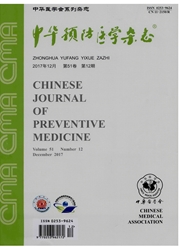

 中文摘要:
中文摘要:
目的采用个体噪声暴露测量方法,了解冷轧厂工人噪声暴露的水平和特点,为防治轧钢工的噪声职业危害提供基础数据。方法以轧钢厂4个主要工艺中的11个工种为分组单位,每组抽取3~5人,用SH-126记录式个体声剂量计对白班(8:00至16:00)工人进行个体噪声暴露测量,同时填写工时记录,计算8h等效A声级。结果轧钢厂现场复杂,噪声源数量多、不稳定,工人同时受到多个噪声源的影响,个体噪声暴露声压级波动大。53名工人中个体噪声暴露最大值为100.0dB(A)。最小值为81.2dB(A);噪声暴露水平最高的头部焊工为94.20dB(A),最低的纵切剪切工为89.02dB(A);质量枪验工组内极差最大,为16.3dB(A);轧机主操作上极差最小,为2.3dB(A)。提示采取个体噪声暴露测量方法能比较准确、完整地反映冷轧厂作业工人的复杂噪声暴露情况。结论冷轧厂个体噪声暴露均超过85dB(A),应加强噪声防护。个体噪声剂量计是以工人为主体,反映个体的噪声暴露情况和接触水平。
 英文摘要:
英文摘要:
Objective To measure and evaluate the personal noise exposure of cold rolling mill workers by using noise dosimeter. Methods According to job category and work type, all workers were divided into 11 groups. 3 to 5 day shift (8:00 to 16:00) workers from each group were selected as subjects for personal noise exposure measurement. SH-126 dosimeters were worn by each subject and collect noise data by a phone fix at collar. All subjects were asked to take notes about their working activities when they were wearing SH-126 dosimeters. Each worker's LAeq of 8 hours, geometric mean and range of each group were computed. Results There were many noise sources in the workshop. Recorded data showed that noise exposure of cold rolling mill was unstable. The varieties of personal noise levels were quite large. Among 53 workers, the highest noise exposure level was 100. 0 dB(A), the lowest was 81.2 dB(A) ; the highest work type was of the foreside welders [ 94.20 dB(A) ], and the lowest was of the straight-cutters [ 89. 02 dB (A) ] ; quality checkers had the biggest rang [ 16. 3 riB(A) ], and primary rolling workers had the lest [ 2. 3 dB(A) ]. Conclusion Noise exposure of all the 11 groups were more than 85 dB(A). Noise protection of these workers should be improved. It suggested that measuring personal noise exposure individually with dosimeters might obtain the noise exposure level more integrally in the complicated environment.
 同期刊论文项目
同期刊论文项目
 同项目期刊论文
同项目期刊论文
 期刊信息
期刊信息
